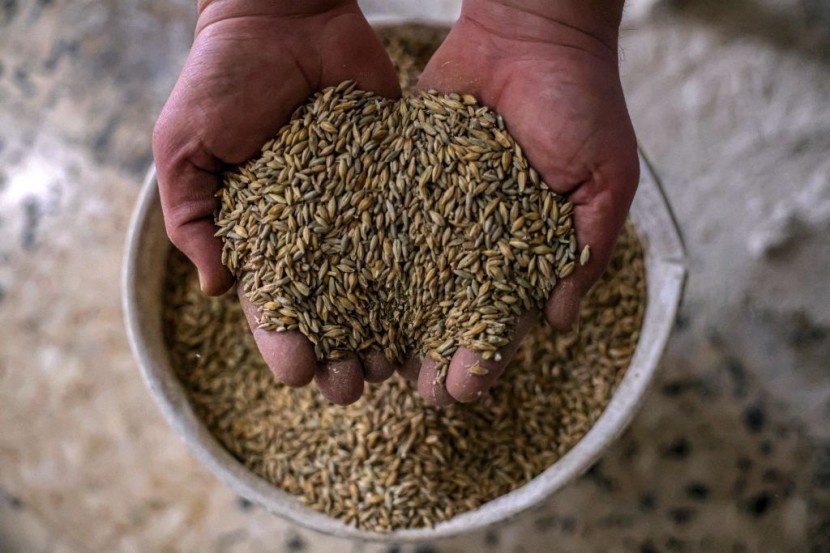
According to the foreign minister of Ukraine, resuming grain exports from its ports will require security assurances for ship owners, cargo owners, and Ukraine as a sovereign state.
The first face-to-face discussions between military representatives from Russia and Ukraine in months were scheduled to take place on Wednesday. They were to meet in Istanbul to talk about a United Nations proposal to get grain from Ukraine that was being kept off from reaching global markets through the Black Sea.
Ukraine Hopes For Breakthrough in Istanbul Talks
Dmytro Kuleba, the foreign minister of Ukraine, said any deal must guarantee that Russia "will respect these corridors, they will not sneak into the harbor and assault ports or that they will not attack ports from the air with their missiles" before the discussions even begin.
The Ukrainian military is "planning and preparing for full liberation" of Russian-occupied cities and villages close to the country's Black Sea coast, Kuleba added in a statement to the AP on Tuesday. As Russia focuses on eastern Ukraine, the Ukrainian military has already increased their efforts to recover land there.
When asked about discussions to resolve the conflict, which broke out when Russia invaded the neighboring Ukraine on February 24, the foreign minister responded that it was doubtful that peace talks would take place soon.
The UN Secretary-General Antonio Guterres and the Turkish government were lauded by Ukraine's senior diplomat for enabling Wednesday's discussions on grain exports. The meeting between Russian and Ukrainian military leaders is supposed to include participation from a Turkish delegation and UN representatives.
Officials have been attempting to resolve the standoff for months without escalating the conflict or, worse, bringing Russia and NATO into direct conflict. The meeting on Wednesday increases expectations for a breakthrough, but more than a dozen officials who were personally engaged or informed on the preparations mentioned challenges in interviews that ranged from the unimportant to the outright 'Mission Impossible,' as per The New York Times.
Read Also : Russia-Ukraine War: Vladimir Putin's Forces Kill 29 in Donetsk Attack, Ukraine Strikes Back in Kherson
Global Prices of Essential Commodities Continue to Increase
More than 22 million tons of grain are stranded at Odesa and other Black Sea ports that are being blockaded by Russian warships. The suggested options, transporting the grain overland or across the Danube River, have been too slow, laborious, and small-scale to handle the issue.
The price of essential commodities like wheat and barley has reached record highs as a result of the war in Ukraine, which is already causing a worldwide food crisis. The most severe and immediate repercussion is the impending famine in the Horn of Africa, where years of rainy season failures are already wreaking havoc on populations in Somalia and areas of surrounding nations. A major supplier for that region is Ukraine, the fourth-largest exporter of grains worldwide.
Problems in navigating Black Sea landmines, setting up at-sea inspections of the cargo, and, most importantly, persuading the Kremlin that it is interested in cooperating are hindering foreign diplomatic efforts.
Since the estuary was reopened, 16 foreign cargo ships, according to the Infrastructure Ministry, have docked in Ukrainian ports, while many more are awaiting clearance to enter through Romania's Sulina Canal. According to the Ukrainian Grain Association, it is a significant move that will help the situation but is insufficient to allow for a complete recovery of exports.
Alexander Karavaytsev, a senior economist with the International Grains Council, agrees with that. "While there is some upside potential for river shipments, as well as for rail and road transport, albeit limited, this is not likely to be a solution without the re-opening of deep sea ports," he told the BBC.
In contrast to the needed 8 million tonnes each month, Ukraine only managed to export only 2.5 million tonnes of grain in June. Only four boats may travel current routes each day.
And it is the crucial aspect. In order to properly resolve the food problem, the Black Sea must be reopened. To make it happen, difficult talks, compromise, and probably promises from the UN will be needed. António Guterres, the UN Secretary General, acknowledges that it would be challenging and states that "[they] are working hard, but there is still a lot to go."
But things are getting better in Ukraine. The minister of infrastructure assured that he was certain a solution could be found. Additionally, Dmytro Kuleba, the foreign minister, stated on Facebook that he thought a deal with Russia was "two steps away" and that it will happen very soon.
Related Article: Vladimir Putin Offers Fast-Track Citizenship Process for Ukrainians as Invasion Rages on Between Russia, Ukraine
@YouTube
© 2025 HNGN, All rights reserved. Do not reproduce without permission.








